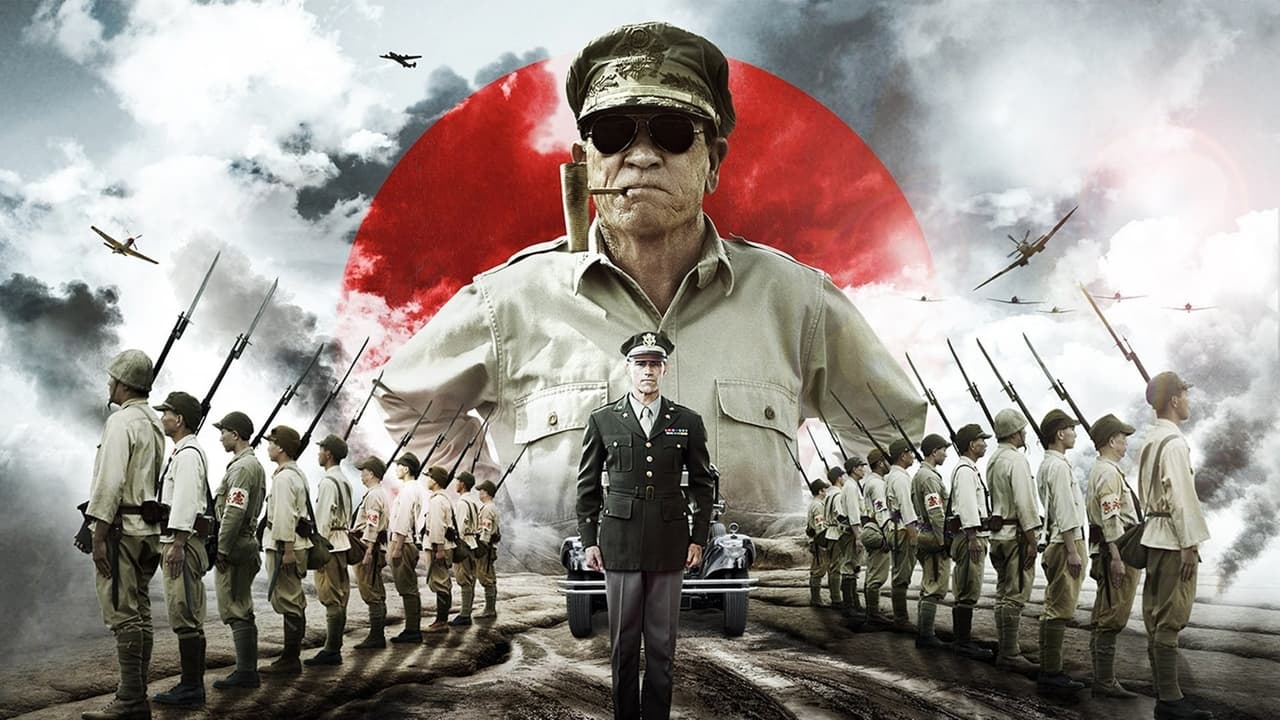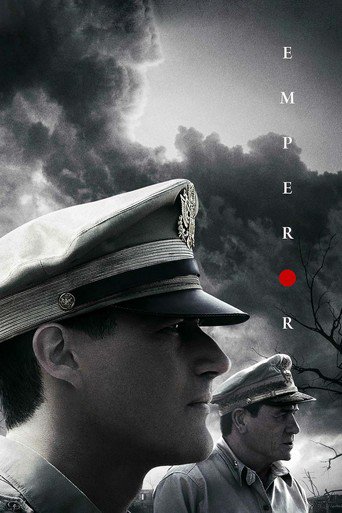

I love this movie so much
... View MoreI have absolutely never seen anything like this movie before. You have to see this movie.
... View MoreI wanted to like it more than I actually did... But much of the humor totally escaped me and I walked out only mildly impressed.
... View MoreExcellent and certainly provocative... If nothing else, the film is a real conversation starter.
... View MoreIt seems that historical movies like this are getting harder to find. It is an movie about an American general in Japan just after their surrender. He has an assignment to determine if Hirohito should be tried as a war criminal.
... View MoreEmperor mixes fact with fiction and introduces a clichéd love story subplot which detracts from the film.The film follows US Army Brigadier General Bonner Frank Fellers (Matthew Fox) who spent time in Japan before the outbreak of the war and ordered by General Douglas MacArthur (Tommy Lee Jones) to decide whether Emperor Hirohito regarded as a living god by the Japanese should be tried and hung as a war criminal. In the mean time the US Forces are rounding up the guilty men who were in power in Japan when it allied itself with the Germans.Mixed with this interesting aspect of the plot is a dull romance angle of trying to find a Japanese student he fell in love with in a messed up post war Japan which has just been nuked.The machinations and politicking regarding whether the Emperor should be tried is fascinating and helped by a broad, brash performance by Lee Jones.Matthew Fox though is rather hindered by the script which fails to make his character interesting because of the fictionalized part of the story. The subplot introduces characters in flashbacks that explains why Japan is the country it is to help us understand why it did what it did in the war.It is a shame that the film dilutes a momentous story to make it rather anodyne.
... View MoreThis is one of the best movies I've ever seen. It covers a historical event where government officials acted in a wise manner, and in a way that could badly damage their political standing.At the end of WWII the American people were very angry with Japan and the Japanese government for the sneak attack that killed 2000 Americans, all of the Americans killed in the war and atrocities committed by the Japanese against American POW's. Much of this anger was directed at Emperor Hirohito who was seen as the instigator of the war.General Douglas MacArthur was placed in charge of the occupation force in Japan and tasked with the job of finding and arresting war criminals. MacArthur knew what the execution of Hirohito would do to the Japanese people and desperately needed an excuse to spare him.The film follows the efforts of General Bonner Fellers who, under MacArthur's orders was placed in charge of this difficult job. Fellers though has another very personal mission: Discovering the fate of a young Japanese woman he had fallen in love with before the war and tried to protect after being placed in charge of strategic bombing missions against Japan by rerouting them away from where she lived.Several people share their stories with him of what happened during the war, including his girlfriend's uncle who had served in the military in the war.It is rare for government officials to act wisely and even more rare for film makers to produce such a fine work as Emperor!
... View MoreEmperorJapan still had over six million soldiers under arms when their empire surrendered after the dropping of the second atomic bomb on the country – on Nagasaki on 9 August 1945. This film details how the decision about the fate of emperor Hirohito was arrived at. Japan's cities and industrial base had been virtually bombed out of existence and Russia had invaded part of its empire as well.This film should resonate with South Africans as it is about the transition from fascism to democracy - and how certain leaders were saved to lead that democracy.The way in which the American troops apprehended the top Japanese leaders (like General Togo) in the course of one night made me think about how the Apartheid police used to descend simultaneously on our leadership in a short space of time and eviscerate our liberation movements swiftly and with Teutonic efficiency. I'll never forget fortuitously meeting Dr Farouk Meer outside Dormerton post office one morning after one his spells of detention. I mentioned to him that the South African Medical Council's approval of segregated medical facilities rendered that organisation unfit to do its job. He repeated what I said. There was a fasciculation on his face and his speech was a bit slurred. I felt for him.He told me that the Apartheid police were now not just targeting the leadership – they were going for the second and third tier of activists as well. The ubiquitous informer network kept people under tight surveillance. There was little one could say or do back then that they did not seem to know about with alarming alacrity – and they harassed you. The Americans held the view that the emperor of Japan had authorised the war against the American, Dutch, French and British possessions in Asia; these Western empires had conquered much of Asia including countries like the Philippines, Indonesia, Vietnam, Singapore, Malaya and Burma. Therefore he should be hanged as a criminal.There is a telling scene where a Japanese leader tells the American investigator, General Fellers, (played by Matthew Fox) who leads the team charged with deciding on the fate of the emperor that none of the US, British, French or Dutch leaders had been tried for bombarding, terrorising and conquering Asian countries which had then become part of their empires. The West had held onto their conquests by preventing the growth of democracy and by denying the conquered their human rights. The Japanese male says that the European empires' example was simply being emulated by his country. The American had no answer.Interwoven in this sensitively told, well thought-out and interesting story is a tale of love – the love that the investigator (who had written a pre-war report on the psychology of the Japanese soldier) had for a Japanese student whom he had met at an American university. One can deduce that the American was a senior member of US Military Intelligence. Japanese culture values very highly the ethic of hard work, a sense of honour and responsibility, order and cleanliness, a sense of duty, loyalty, respect, patriotism, dignity and protocol, even if in preserving these values, death might ensue. Japan was ruined after World War II and one would have expected that the country would take generations to recover, as happened with so many countries which had eventually won their freedom from the Free West. Perhaps some of the values that the Japanese hold dear helped them to finally reject the martial path that had led to disaster and to rebuild their people, their education system, their economy and their country into what it is today.At the end of World War II, the Allies were desperate to ensure that the defeated fascist powers would be rebuilt and again become bulwarks against the communists (but this time fettered bulwarks). The Reds were undermining the strangle-hold that the 'Free West' had on most of the planet and its conquered peoples; the West had in its clutches most of the world's resources from gold to diamonds to oil to platinum. At the end of the day, the victorious western European empires were not all that different from the blood-thirsty fascist empires that they had crushed. The Americans, headed by General MacArthur, (portrayed with flamboyant panache by Tommy Lee Jones) were in a very difficult place. It was amazing for me to see the American investigator walking alone through the rubble of bombed Japanese cities and among gaunt, haggard, hungry Japanese families.During the pre-war period in both Japan and Germany, those who had opposed the war-mongers were often bloodily murdered and the people of both countries were terrorised into submission; brainwashed and conquered populations became pawns in the grimy hands of the villainous dictators and the gangster elites who were determined to destroy and loot other countries and empires. Now the Japanese thugs stayed their blood-stained hands and did not seek revenge on the lone American. (He is, however, beaten up when he drinks alone in a Japanese bar).The movie demonstrates a remarkable degree of respect for the challenges faced by both the Japanese and the Americans. During the era of total European hegemony ie. the pre war period and even the era after that, the non Europeans were regarded by many Europeans as filthy, rather retarded, servile, nauseating, primitive apes: not quite human; not quite 'normal'; certainly not 'civilised' (what-ever that might mean). Many non whites were, and are, rather ashamed of who they are – and even more ashamed of the people whose colour and culture they happen to share. They appear to derive great pleasure from denigrating and dishonouring the non white peoples to whites whose respect they crave. They spend much of their time trying to escape their skins.I am so glad that I saw this film.
... View More